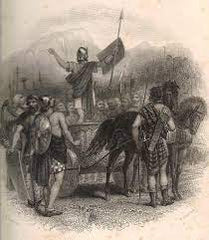Scotland’s Unification History

Mary’s legacy to Scotland was give birth to James VI who became James I of England and so unified Scotland and England at last. However the religious split across the newly unified nation did not go away. The covenanters emerged and were persecuted for their beliefs, Britain was thrown into a bloody civil war which resulted in the protectorate of Cromwell. The Crown was soon restored but the troubles did not end there. the Stewart right to the throne was challenged and won by William of Orange. Scotland suffered a double blow after this; firstly in our darkest moment as the MacDonalds of Glencoe (above) were famously massacred and secondly in the ill fated Darien scheme. This failed venture to establish a trading colony in the new world all but bankrupted Scotland and lead indirectly to the Act of Union and the end of Scottish independence.

|
1603 – The Union Of The CrownsThe son of Mary, Queen of Scots, and Lord Darnley became King of Scotland upon his mother’s forced abdication in 1567.READ MORE |
 |
1638 – The Second CovenantCharles I’s views of himself, theology and politics became increasingly contradictory to the beliefs of the Presbyterians. Charles tried to bring together the laws and churches of Scotland and England, with all roads leading to himself.READ MORE |
 |
1644 – Campaign of the Marquis of MontroseJames Graham, 5th Earl and later 1st Marquis of Montrose, was born in 1612 and studied at St Andrew’s University. In 1638 he contributed to the National Covenant, and fought for the Covenant in the Bishops’ Wars.READ MORE |
 |
1644 – Battle of TippermuirIn the August of 1644 James Graham, 1st Marquis of Montrose, combined his force of cavalry and Highland foot soldiers with Alasdair MacDonald’s Irish soldiers to begin a campaign against the Covenanters for Charles I.READ MORE |
 |
1645 – Battle of AldearnUnder James Graham, the Marquis of Montrose, the Royalist army had achieved success at Inverlochy and Dundee. He made camp with his 1750 men and 250 horses at Auldearn, around three miles to the east of Nairn.READ MORE |
 |
1645 – Battle of PhiliphaughThe Marquis of Montrose had contributed to the 1638 Covenant and had served with his opponent of this day General sir David Leslie in the Covenanter’s army. However sickened by some of the extremist actions of the Covenanters he had switched to the Royalists.READ MORE |
 |
1646 – Charles I Surrenders to the ScotsCivil War had begun in earnest by 1642. Charles I was the enemy of the Presbyterians in Scotland and the parliamentarians in England. His lack of ability at negotiation and conciliation had compounded his situation.READ MORE |
 |
1650 – Battle of DunbarThe Calvinists were in support of Charles II when he became King and signed both the Covenants in 1649. Cromwell, however, was not. With sixteen thousand men he invaded Scotland in July and headed for Edinburgh, expecting to rendezvous with his supply ships at Leith. David Leslie and the Scots army did not let him.READ MORE |
 |
1651 – Battle of InverkeithingThe execution of King Charles I changed the whole course of the Civil war. The Scots recognized his successor. Cromwell pushed North destroying Leslie’s army on the 3rd of September 1650. The Scots still had hold of Scotland north of the forth.READ MORE |
 |
1666 – Pentland RisingThe covenanting ministers who rejected the Restoration settlement with Charles II’s additions, found themselves replaced by curates and without a living.READ MORE |
 |
1671 – Rob Roy MacGregor BornBorn in 1671 at Loch Katrine, the third son of a Lieutenant-Colonel, MacGregor’s inherited long arms and great strength gave him abilities with the broadsword that made his name known to many. He fought at Killiecrankie for Viscount Dundee in 1689 before joining the Lennox Watch.READ MORE |
 |
1679 – Battle of Bothwell BridgeFollowing success against the military at the recent Battle of Drumclog, the Conventiclers’ support had swollen to six thousand when they came together at Hamilton in June 1679.READ MORE |
 |
1689 – Battle of KilliecrankieNews came to Jacobite leader Viscount Dundee, John Graham of Claverhouse, that General Hugh MacKay would be moving his men from Stirling to Blair Castle. Dundee, known by his supporters as Bonnie Dundee and by the Covenanters as Bloody Clavers, took his twenty five hundred Highlanders over the Drumochter Pass near Blair on 26 July 1689.READ MORE |
 |
1689 – William of Orange CrownedJames had converted from Protestantism to Catholicism in 1668 whilst his brother Charles II was monarch. When the King too converted and tried to re-install Catholicism among his subjects around 1672, there was outrage. Acts were passed in Parliament, such as the Test Act, so only Anglicans could hold positions of office.READ MORE |
 |
1692 – Massacre of GlencoeWhile the other MacDonald clans suffered through the 1500s, the MacDonalds of Glencoe survived notably well. Perhaps their greatest protection was their home environment acting like a natural fortress. They certainly never found the need to build one.READ MORE |
 |
1698 – Darien VentureFor twenty years the London East India Company had enjoyed soaring success, bringing incredible fortunes to its stockholders through its virtual monopoly of Eastern trade. By 1695 competitors in the market were using every scandalous technique to have Bills in their favour passed in England’s Parliament, and in return were being undermined by the EIC happily operating at the same low levels to retain dominance and political favouritism.READ MORE |
 |
1707 – The Act of UnionThe Highland Dress Proscription Act of 1746, designed to punish the clans and destroy their identities and economic stuctures, was repealed in 1782 after thirty six years in law.READ MORE |
